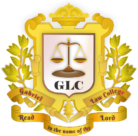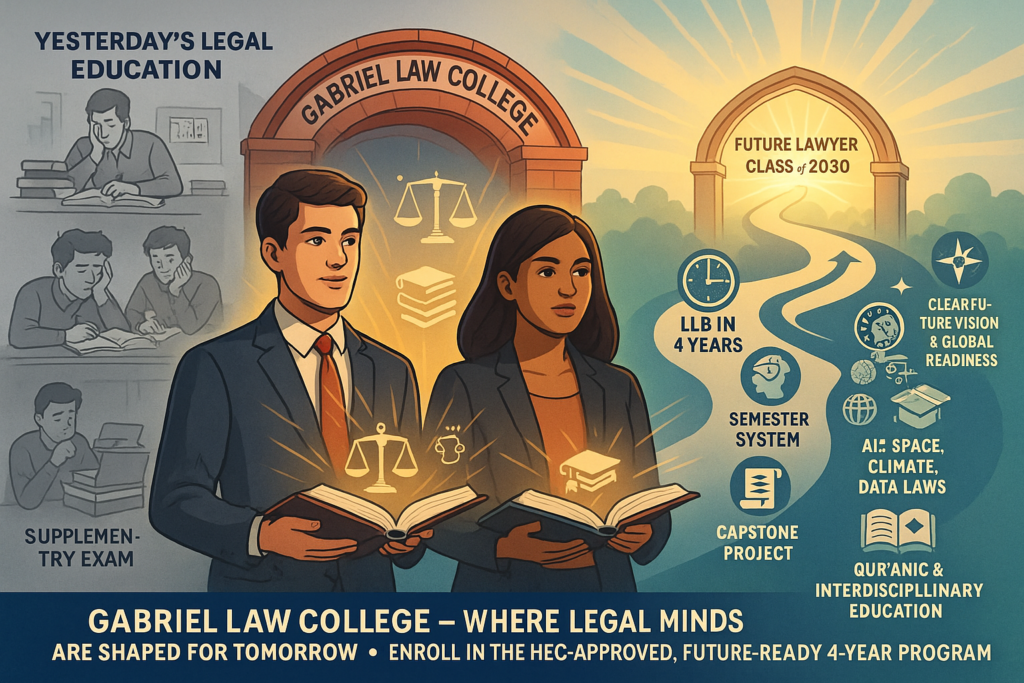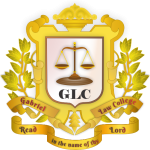Author: Zishan Haider
Are you passionate about justice, leadership, and making an impact in society? The newly launched 4-year LLB program, approved by the Higher Education Commission (HEC) and backed by the Directorate of Legal Education of the Pakistan Bar Council, offers a golden opportunity to earn a law degree that matches the standards of top international universities, that also right here in your country, your district, your city — Mandi Bahauddin.
At Gabriel Law College, Mandi Bahauddin, we invite you to be part of a transformative legal education experience that prepares you not just to practice law, but to shape it.
What Makes the New LLB Program Exceptional?
1. Fast-Track Your Future:
Earn your professional law degree in just 4 years, equivalent to any BS program. No more waiting five long years to become a law graduate.
2. Open Doors for All without Restrictions:
There’s no study gap restriction after the intermediate exam. Your journey to becoming a lawyer can begin any time in your lifetime.
3. Modern Semester System:
Say goodbye to outdated annual exams. With the semester system, you’ll study, engage, and be assessed in real-time, making the learning more meaningful, less stressful, and free from the pressure of excessive and repetitive supplementary papers.
4. A Well-Structured, Globally Aligned Curriculum:
The entire program is carefully designed with 15 General Education courses, 3 Interdisciplinary courses, and 31 Major law subjects. Majors include 25 core courses and 6 elective courses — ensuring you receive a balanced, in-depth, and holistic legal education.
5. Customise Your Legal Journey:
Law is no longer a dry or rigid field. With 6 elective courses in your final three semesters, you can tailor your education to your interests.
6. Real-World Learning with Capstone Project:
In your final semester, you’ll complete a capstone project and internship. It is a research-based or practical assignment that proves your ability to apply legal knowledge in solving real-life problems. No shortcuts, no replacements — just real experience.
7. Purpose-Driven Legal Professionals:
By the time you graduate in 2030, you won’t just be another law graduate. You’ll be an exceptional future-ready legal professional, with a strong portfolio of specialised subjects, a capstone project and a clear vision for your career in law, public policy, the corporate sector, or global advocacy.
8. Islamic & Interdisciplinary Learning:
The newly introduced curriculum is designed to enrich students’ religious understanding through courses, such as Fehm-e-Qur’an in Semesters I and III, alongside social science courses to be selected from the list of interdisciplinary courses, broadening their worldview and analytical skills. Non-Muslim students may also replace the Fehm-e-Qur’an courses with the equivalent credit hours of social science courses taken from the same list.
Program Structure Summary of New LLB 4-Year
|
Component |
Details |
|
Minimum Credit Hours |
146 |
|
General Education Courses |
35 credit hours (14 courses) |
|
Discipline Related Courses / Major |
93 credit hours (31 Courses) |
|
– Core Courses |
75 credit hours (25 Core Courses) |
|
– Specialization Electives |
18 credit hours (6 Courses) |
|
Interdisciplinary / Allied Courses |
12 credit hours (4 Courses) |
|
Field Experience / Internship |
03 credit hours |
|
Capstone Project |
03 credit hours |
Program Duration
- Minimum: 4 Years
- Maximum: 6 Years
(Further extendable to another year subject to the approval of the university’s statutory body following the provisions of HEC Undergraduate Education Policy 2023 V 1.1)
Semester Duration
- Regular Semesters: 16–18 weeks
(1–2 weeks for examination) - Summer Semesters: 8–9 weeks
(1 week for examination)
Course Load (per semester)
- 15–18 credit hours for regular semesters
- Up to 8 credit hours for summer semesters (For remedial/deficiency/failure/repetition courses only)
Contact Time
|
Credit Hours |
Weekly Contact Time |
|
3 Credit Hours (Theory) |
– 3 classes (1 hour each) OR |
|
1 Credit Hour (Practical Work) |
3 contact hours per week throughout the semester |
General Education Courses
- Quantitative Reasoning-I
- Quantitative Reasoning-II
- Functional English
- Applications of Information and Communication
Technologies - Pakistan Studies
- Social Science
- Expository Writing
- Natural Science (Environmental Sciences & Law)
- Fehm-e-Quran-I (for Muslim Students)
- Fehm-e-Quran-I (for Muslim Students)
- Islamic Studies (Religious Education / Ethics for
non-Muslim students) - Arts and Humanities
- Constitutional Law of Pakistan (Ideology and
Constitution of Pakistan) - Entiepieneurship
Core Major Courses
- Introduction to Law and Legal Systems
- Principles of Constitutional Law
- Criminal Law
- Law of Contract
- Law of Torts
- Islamic Jurisprudence
- Jurisprudence
- Law of Evidence
- Civil Procedure Code-I
- Civil Procedure Code-II
- Criminal Procedure Code-I
- Criminal Procedure Code-II
- Law of Property
- Equity, Trusts and Specific Relief
- Law of Business Organisations-I
- Law of Business Organisations-II
- Administrative and Services Law
- International Law
- Legal Drafting and Pleadings
- Legal Ethics and Moot Cases
- Land Law
- Islamic Personal Law-I
- Islamic Personal Law-II
- Environmental Law
- Cyber Law
Elective Major Courses
Technology & Law
- Data Protection & Privacy Law
- Artificial Intelligence and Law
- Digital Forensics and Electronic Evidence
- Blockchain and Legal Implications
- Intellectual Property in the Digital Age
- Telecommunication Law
- Legal Tech and Law Practice Automation
- FinTech and Law
- Media Law
Business & Commercial Law
- Corporate Law
- Mergers and Acquisitions
- Banking, Securities & Capital Markets Regulation
- Insurance Law
- Taxation Law
- Custom and Tariff Laws
- International Trade Law & E-commerce
- Start-up Law & Legal Compliance
- Competition & Consumer Law
- Consumer Protection Law
- Islamic Commercial Law
- Intellectual Property Law
- International Trade Law
- International Economic Law
Human Rights & Social Justice
- International Human Rights Law
- Refugee and Migration Law
- Gender Justice and Law
- Disability Rights Law
- Law and Social Movements
- Labour Law
- Public Interest Litigation
- Law and Society
- International Humanitarian Law (IHL)
- Juvenile and Social Justice Law
Environmental & Climate Justice
- Climate Change Law
- Sustainable Development & Environmental Justice
- Water Law and Policy
- Energy Law
- Environmental Governance and Policy
- Law of the Sea and Ocean Governance
- Disaster Law and Climate Resilience
Constitutional Law and Governance
- Comparative Constitutional Law
- Law and Public Policy
- Transitional Justice
- Election Law
- Immigration and Nationality Law
- Decentralisation and Federalism Law
Legal Ethics & Skills
- Legal Writing and Research in the Digital Era
- Legal Clinics
- Professional Ethics (including Technology Focus)
- Mooting, Advocacy, and Drafting (Practical Modules)
- Corporate Compliance and Ethics
- Publication Ethics
- Ethics in ADR and Litigation
Emerging and Specialised Legal Fields / Niche and Frontier Areas of Law
- Space Law
- Sports Law
- Biotechnology and Law
- Health Law & Bioethics
- Medical and Forensic Law
- Law and Development
- Maritime, Shipping, and Admiralty Law
Recommended Interdisciplinary Courses
• Economics
• Sociology
• Psychology
• Political Science
• Gender Studies
• Media
• Public Policy
• History
• Alternative Dispute Resolution (ADR) — Mandatory as recommended by NCRC
• Research Methodology — Mandatory as recommended by NCRC
Capstone Project
It is a mandatory degree award requirement of three (03) credit hours for the Bachelor of Laws (LLB). A capstone project is a multifaceted body of work that serves as a culminating academic and intellectual experience for students. The capstone project must follow the HEC-prescribed guidelines for the degree award and be supervised and graded by a faculty member as per the protocols prescribed by the concerned department. This requirement cannot be substituted with additional coursework or an internship.
Requirement of Field Experience / Internship
It is a mandatory degree award requirement of three (03) credit hours Bachelor of Laws (LLB). An internship of six (06) to eight (08) weeks (preferably undertaken during semester or summer break) must be graded by a faculty member in collaboration with the supervisor in the field. This requirement cannot be substituted with additional coursework, capstone or project work.
Choose Excellence. Choose Gabriel Law College
Join the new era of legal education and become part of a generation that doesn’t just follow the law. It redefines it. Apply now and begin your journey to justice, leadership, and success.


